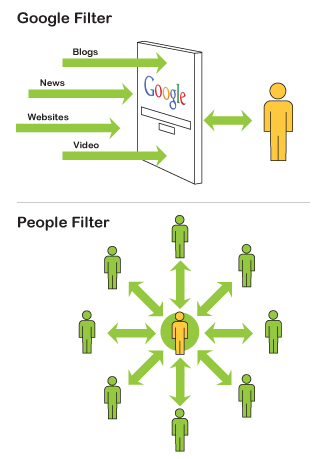 For a good decade, Google has been the king of the Internet. The search engine organizes content based on data such as keywords, links, etc. However, in March 2010, Facebook traffic surpassed that of Google and Facebook continues to grow rapidly with no sign of slowing down. How did Facebook become so important? Will its dominance prevail?
For a good decade, Google has been the king of the Internet. The search engine organizes content based on data such as keywords, links, etc. However, in March 2010, Facebook traffic surpassed that of Google and Facebook continues to grow rapidly with no sign of slowing down. How did Facebook become so important? Will its dominance prevail?
I believe the answer is yes (provided they don’t screw up on execution) but not because the social media network allows people to connect and stay connected. I believe Facebook has found a different paradigm to organize content on the Internet—by using people as filters, as opposed to Google’s approach where data is the filter.
With an overwhelming amount of content and diminishing trust towards corporations, people increasingly rely on their friends and families to filter information. The popularity of customer ratings and reviews illustrates this fact.
While many of the exchanges on Facebook are still personal interactions, Facebook is inching towards the vision of organizing content on the Internet in a new way. From the very early features such as Facebook News Feed to Facebook OAuth (formerly known as Connect) and the failed Facebook Beacon feature (that shared out what your friends purchased), Facebook has been moving its users slowly but surely towards information organized through people.
Such paradigms are increasingly popular. Twitter—the other powerhouse in the social media space—is also wildly successful for the very same reason. People are connected to pertinent information based on who they follow. Flipboard, a top iPad app, took things one step further. Similar to Twitter, the app leverages people in your network to point you to what information to pay attention to. But instead of displaying it in 140 characters of text, the app displays content in a beautiful magazine format, catered just to you.
Having said all this, it begs the question whether Google will become obsolete. My prediction is no. When the television rose in popularity, it didn’t replace print as some had predicted and when the Internet rose up, it didn’t replace television. Different solutions have their own pros and cons. In the end, they have all found their own place in the user’s ecosystem.